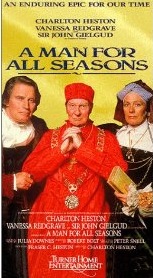This article needs additional citations for verification .(June 2019) |
| A Man for All Seasons | |
|---|---|
 VHS cover | |
| Genre | Drama |
| Based on | A Man for All Seasons 1960 play by Robert Bolt |
| Written by | Robert Bolt |
| Directed by | Charlton Heston |
| Starring | Charlton Heston Vanessa Redgrave Sir John Gielgud |
| Music by | Julia Downes |
| Country of origin | United States |
| Original language | English |
| Production | |
| Executive producer | Peter Snell |
| Producer | Fraser C. Heston |
| Cinematography | Dennis Lewiston |
| Editor | Eric Boyd-Perkins |
| Running time | 150 minutes |
| Production companies | Agamemnon Films British Lion |
| Original release | |
| Network | TNT |
| Release | December 21, 1988 |
A Man for All Seasons is a 1988 American made-for-television drama film about St. Thomas More, directed by and starring Charlton Heston. It is based on the play of the same name by Robert Bolt, which was previously adapted in the Academy Award winning 1966 film A Man for All Seasons . It was the first made-for-television film produced on behalf of the TNT (Turner Network Television) television network.
Contents
The film stars Heston as More, Vanessa Redgrave (who had a small cameo in the version from 1966) as his wife Alice More, Sir John Gielgud as Cardinal Thomas Wolsey, Martin Chamberlain as King Henry VIII, Richard Johnson as the Duke of Norfolk (historically, Thomas Howard, 3rd Duke of Norfolk), and Roy Kinnear as the narrator, "The Common Man", who was cut from the previous film. (The "Common Man' functions in the manner of a Greek chorus throughout the play, appearing at crucial moments and seeming to comment on the action.)
The film follows the original stage play more literally and runs half an hour longer than the 1966 film, and could be considered "stagier" than that film, which divided the Common Man into several more realistic characters and omitted portions of the play.